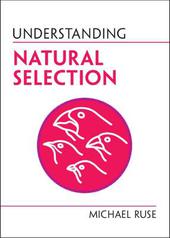
|
Understanding Natural Selection
Paperback / softback
Main Details
Description
Natural selection, as introduced by Charles Darwin in the Origin of Species (1859), has always been a topic of great conceptual and empirical interest. This book puts Darwin's theory of evolution in historical context showing that, in important respects, his central mechanism of natural selection gives the clue to understanding the nature of organisms. Natural selection has important implications, not just for the understanding of life's history - single-celled organism to man - but also for our understanding of contemporary social norms, as well as the nature of religious belief. The book is written in clear, non-technical language, appealing not just to philosophers, historians, and biologists, but also to general readers who find thinking about important issues both challenging and exciting.
Author Biography
Michael Ruse is Professor Emeritus at the University of Guelph, Ontario. He is a Guggenheim Fellow, a Gifford Lecturer, a Fellow of the Royal Society of Canada, and the recipient of four honorary degrees. He is the author/editor of over sixty books, including The Cambridge Encyclopedia of Darwin and Evolutionary Thought (Cambridge University Press, 2013); The Gaia Hypothesis: Life on a Pagan Planet (University of Chicago Press, 2013); Darwinism as Religion: What Literature Tells Us about Evolution (Oxford University Press, 2016), and The Cambridge History of Atheism (Cambridge University Press, 2021).
Reviews'Michael Ruse has written many books on evolutionary theory, but this may well be his best: succinct, clear, and comprehensive. Your interpretation of Darwin's accomplishment may differ from Ruse's - mine does - but he offers the classic view of Darwin as having introduced mechanism into biology. His treatment of natural selection runs from an intense examination of Darwin's development of the concept to its role in population genetics and morality. It's a gem of a book.' Robert J. Richards, Morris Fishbein Distinguished Service Professor of the History of Science, University of Chicago, USA 'Michael Ruse at his best! This consummate scholar, educator, and communicator on all things evolutionary has gifted us with a masterwork on Darwin's crowning achievement - the theory of natural selection. We now have the definitive 'sourcebook' on this important topic.' Michael L. Peterson, Professor of Philosophy, Asbury Theological Seminary, USA 'For decades, Michael Ruse has been a leader in thinking about natural selection. This book is a quick, thorough survey of the subject. Plus, it offers some important recent twists. A masterful writer, Ruse quickly covers the basics before guiding readers outside traditional boxes so they might consider new possibilities. Understanding Natural Selection is certain to encourage debate and investigation. It also will inspire further interdisciplinary synthesis.' Joe Cain, Professor of History and Philosophy of Biology, University College London, UK 'In this brief book written for the general reader, Michael Ruse skillfully weaves together the history and philosophy of science to explore natural selection, the concept at the heart of Darwin's celebrated theory of evolution. The writing is brisk, engaging, thoughtful and at times fun, typical of the kind of work we have come to expect from someone who has a devoted a lifetime of study to understanding Darwin and his theory.' Vassiliki Betty Smocovitis, Professor of the History of Science, University of Florida, USA 'Natural selection is one of the most important and contested ideas in modern science, helping us understand much of the functional design and order we observe in living nature. In his inimitable way, Michael Ruse gives the definitive account of natural selection, from its Darwinian origins and metaphorical foundation to the many historical, philosophical and scientific controversies that have swirled about it in the last century and a half. If you want to understand natural selection, you can do no better than a careful reading of this compact, highly informative and lively book. It is truly a tour de force.' Richard A. Richards, Professor and Chair, Department of Philosophy, University of Alabama, USA
|